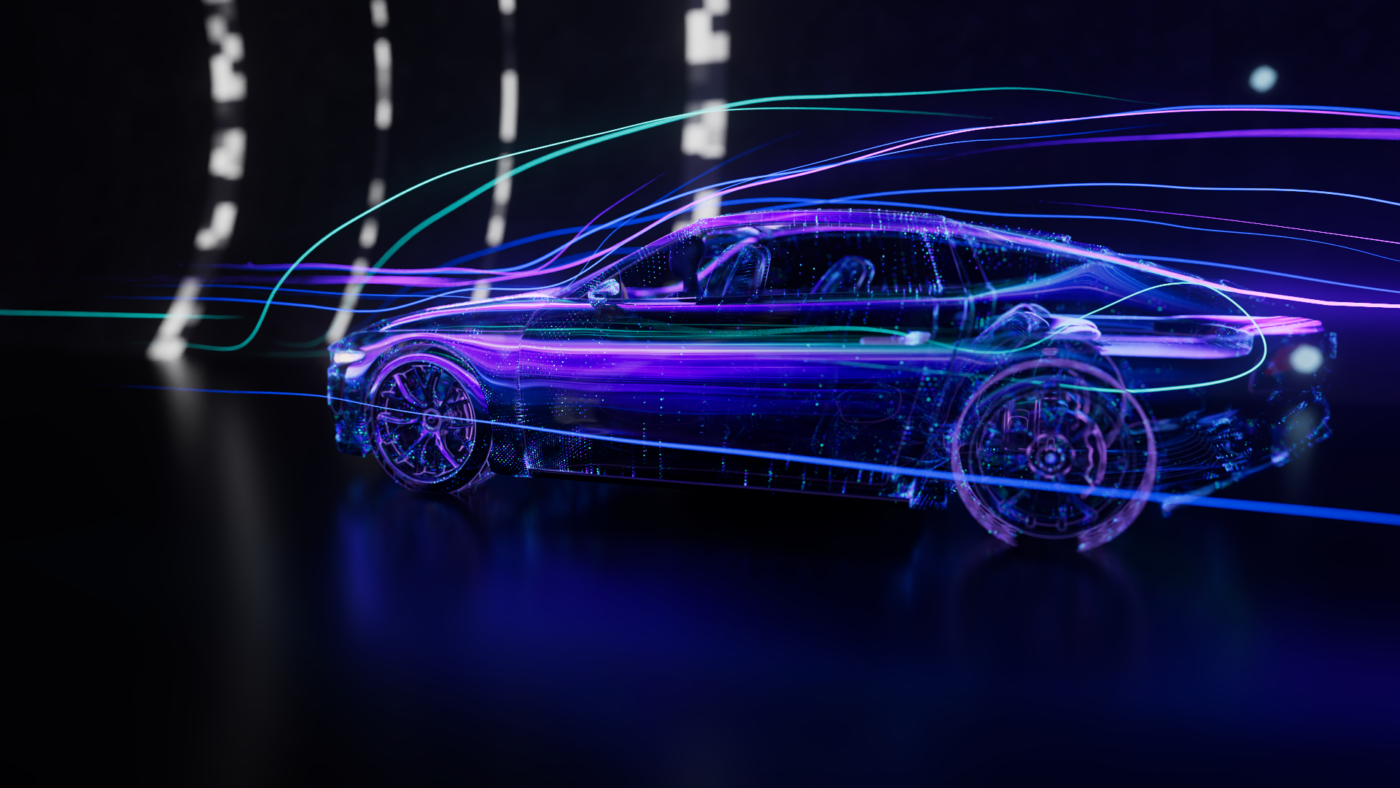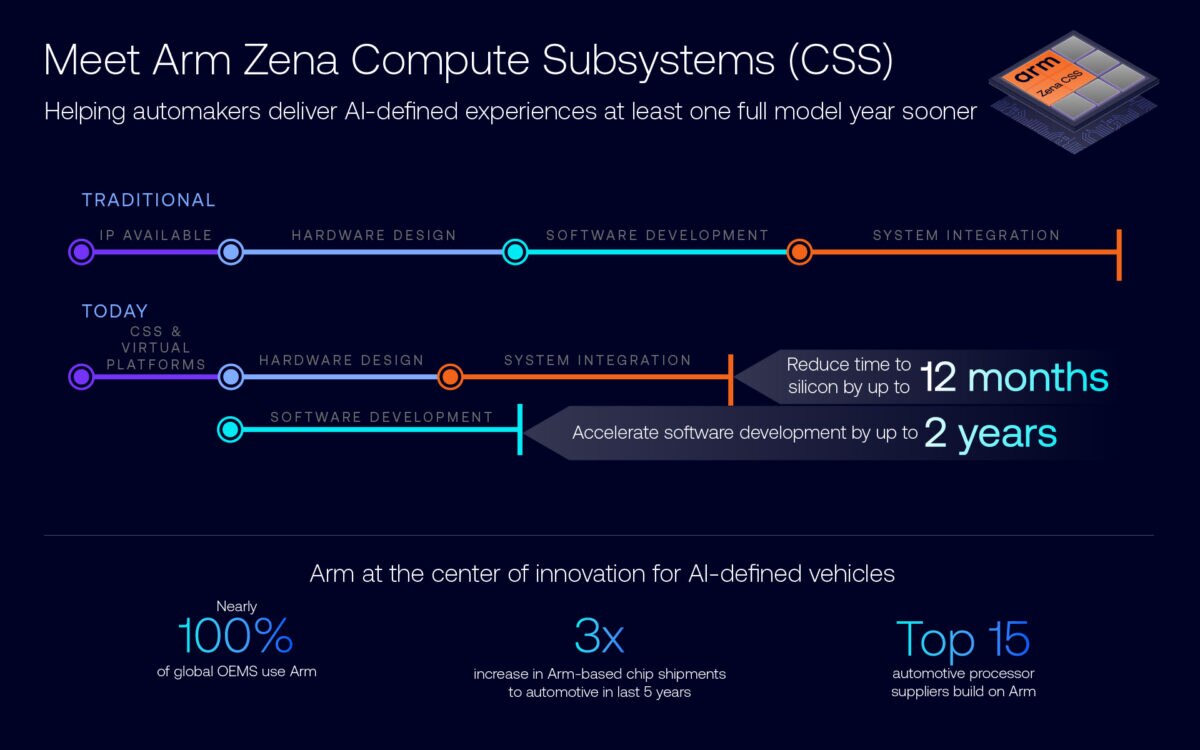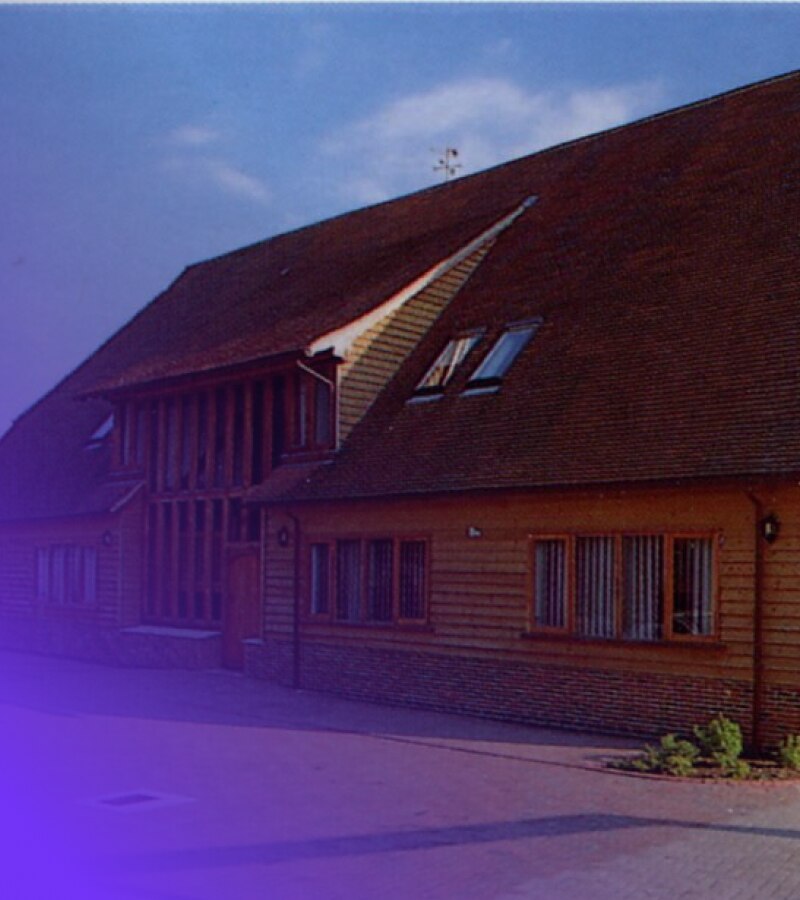Automakers Can Launch AI-Defined Vehicles a Full Year Sooner – Powered by Arm Zena CSS

News highlights:
- Arm enables automakers to bring new vehicle models to market at least one year faster than traditional timelines
- Zena CSS accelerates software and silicon development, helping deliver AI capabilities faster and more efficiently
- Pre-verified, safety-capable platform saves an estimated 20% of engineering resources, reducing development cost and complexity
- Majority of OEMs will build on the Zena CSS family of products in the coming years
Bringing innovation to drivers faster is one of the toughest challenges automakers face today. Traditional silicon development times often delay vehicle rollouts, preventing carmakers from delivering the AI-powered features that today’s drivers expect.
That changes with Arm Zena Compute Subsystems (CSS).
Zena CSS enables automakers to launch new vehicle models at least one year faster, with a standardized, pre-integrated compute platform that dramatically shortens development cycles and enables software teams to start early – before silicon even exists. This accelerates time-to-market, scales AI capabilities across vehicle lines, and helps automakers stay competitive in the rapidly evolving era of the AI-defined vehicle.
Nearly every global OEM today, including Tesla, Rivian, NIO, Mercedes-Benz, Honda, and Geely, relies on Arm technology as the foundational compute platform powering everything from safety-critical ADAS to immersive in-cabin experiences. The next generation of vehicles will demand even more: pervasive and personalized intelligence that adapts and updates in real time across the vehicle.
Accelerating AI-defined experiences across every model
To compete in the AI era, automakers need scalable compute, without compromising safety, power efficiency, or flexibility. Zena CSS reduces chip development time by up to 12 months and cuts silicon engineering effort by up to 20% per project, helping OEMs and silicon providers bring new vehicle models to market sooner with intelligent voice and touch interfaces, immersive digital cockpit experiences, driver assistance and automation, and real-time awareness.
Introducing Arm Zena CSS
Next-generation vehicles need to run diverse workloads including advanced driver assistance systems (ADAS), in-vehicle infotainment (IVI) and vehicle control systems with varying safety requirements and real-time constraints on a single platform. Built on Armv9 Automotive Enhanced (AE) technology, Zena CSS is our first pre-integrated and pre-validated platform for AI-defined vehicles by delivering:
- 16 Armv9-based Cortex-A720AE cores, performance optimized for ADAS and IVI applications
- Cortex-R82AE powered Safety Island, unique to Zena CSS and used for real-time ASIL D processing capabilities such as fault management, safety monitoring, system control and SoC boot
- Runtime Security Engine with safety-capable Hardware Root of Trust (RoT), leveraging Arm TrustZone technology to manage SoC-level security
- CPU coherency and chip-to-chip connectivity provided by CMN S3AE
- Optional Image Signal Processing powered by Mali-C720AE and Mali GPU for ADAS use-cases including surround view and driver-monitoring
- Support for easy integration of accelerators and partner-specific logic to meet evolving workload demands for advanced, AI-capable SoC design
This standardized compute platform gives OEMs and silicon providers the ability to reuse architectures and software, accelerating global vehicle delivery, and simplifying system development and integration – all while streamlining functional safety and security certification. This is critical because developing custom hardware and software stacks for every vehicle model and application is costly, time-consuming, and burdensome to validate and certify. Importantly, Zena CSS allows our partners to innovate and differentiate on top of a standard platform in areas that add distinct value to their product lines.
Leading OEMs – including top EV manufacturers – and major silicon providers have already licensed Zena CSS or are in advanced stages of engagement. We expect the majority of the industry to build on the Zena CSS family in the coming years.
Empowering developers to innovate from day one
In addition to reducing time-to-market for silicon, our partners can begin software development on Zena CSS immediately using cloud-based virtual platform support from AWS, Cadence, Siemens and Synopsys, accelerating time-to-market for software innovation by up to two years.
Our developer ecosystem of more than 20 million developers – including Denso, GitHub, Green Hills, Mapbox, Red Hat, Panasonic Automotive, and many more – can now build and test across the full software stack and on a common compute platform. Zena CSS is built on open standards including AUTOSAR, COVESA, eSync, and Virtio, and is backed by SOAFEE, with 150+ members such as General Motors, CARIAD, Continental, and Tata Motors.

The AI-defined vehicle era on Arm
In the last five years, Arm-based chip shipments to the automotive market have tripled – a testament to the industry’s trust in our platform. Now, with Zena CSS, we are giving automakers the tools to build software-defined, AI-enabled vehicles faster, smarter and more efficiently. Pairing that with the unique advantage of cloud-to-car parity – developing and testing on the same Arm architecture in the cloud that you will deploy on in the car – means our partners can be confident that software will run seamlessly from the smallest sensor to the Arm-based cloud.
By cutting chip development time by 12 months, reducing engineering effort, and enabling software innovation to start earlier, Zena CSS helps automakers deliver AI-defined experiences at least one full model year sooner – all made possible on Arm.
Supporting partner quotes:
“Astemo has been working closely with Arm to deliver on the benefits of SOAFEE through our Internet of Vehicles (IoV) platform. With the launch of Arm Zena Compute Subsystems (CSS), we see an opportunity to further accelerate our development by porting our IoV platform onto a standardized compute architecture. Arm Zena CSS enables us to scale more efficiently, harness the benefits of virtual prototyping, and deliver on the growing demands of the Software-Defined Vehicle. We’re excited to continue our collaboration with Arm and help drive the industry toward a more connected and software-centric future.” Keiichi Aida, Executive Vice President, CTO & CISO & Head of Technology Development Functional Division, Astemo, Ltd. (formerly Hitachi Astemo)
“At BMW, we’re constantly exploring innovative approaches to future vehicle compute architectures. Currently we are focusing on hardware-software co-design for advanced embedded machine learning applications such as in automated driving functions and engaging in the definition of future chiplet reference architectures for an open automotive chiplet ecosystem. Arm Zena Compute Subsystems (CSS) provide us with an excellent starting point for our semiconductor simulation work. With Arm’s architecture already deeply embedded across the automotive ecosystem, we highly welcome and appreciate Arm’s support and collaboration in initiatives such as imec’s Automotive Chiplet Program.” Dr. Martin Tietze, Vice President New Technologies, BMW Group
“The transition to software-defined vehicles demands a shift in how we approach compute architectures. Standardized, pre-verified compute subsystems like Arm Zena CSS can significantly accelerate development timelines and reduce complexity across the industry. By integrating such solutions early in the development chain, the automotive industry can streamline complexity and establish a stronger foundation for delivering the safe, intelligent, and connected experiences that define the next generation of vehicles. At Mercedes-Benz, we recognize the value of collaborative platforms that drive the entire ecosystem forward.” Magnus Östberg, Chief Software Officer, Mercedes-Benz AG
“At Panasonic Automotive Systems, we are committed to accelerating the development of Software-Defined Vehicles, and Arm Zena Compute Subsystems represent a significant step forward in this transformation. Building on our ongoing collaboration with Arm and our work, including that within the SOAFEE community, we see tremendous value in porting our SOAFEE Blueprints based on the standard device virtualization framework VirtIO—such as Unified HMI and vSkipGen—to the standardized, scalable platform offered by Arm Zena CSS. Virtual prototyping on a common compute foundation not only reduces time-to-market but also aligns with our vision of a more software-centric, flexible automotive ecosystem. With Arm’s pervasive presence across the industry, we are excited to deepen our collaboration and help shape the future of automotive compute.” Masashige Mizuyama, Executive Vice President and CTO, Panasonic Automotive Systems Co., Ltd.
“Telechips has been a long-standing partner of Arm, and this continued collaboration is key to our mission of delivering high-performance, cost-efficient, semiconductor solutions for the global automotive market with shortened development time. Arm Zena Compute Subsystems (CSS) provide a standardized and scalable compute platform that enables us to accelerate development and focus our efforts on areas of unique innovation. Arm Zena CSS helps us bring competitive, future-ready solutions to market faster—aligned with the demands of software-defined vehicles and the expectations of leading OEMs and Tier 1 suppliers.” Jang-kyu Lee, CEO, Telechips Inc.
Any re-use permitted for informational and non-commercial or personal use only.












